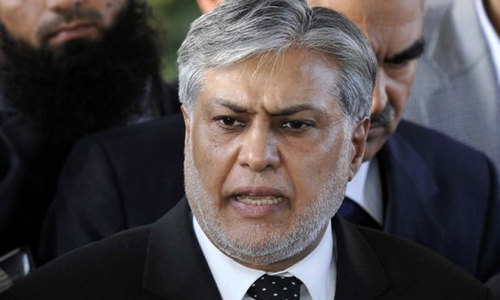
GIVEN the baggage of policy drift and allegations of corruption the PML-N government is shouldering as a result of its largely forgettable performance since 2013, it should be on the lookout for ways to redeem its below par showing in the past four years. It can begin by undoing arguably its most damaging legacy (so far) — a set of misguided and destructive economic policies put in place by the finance minister.
The stifling and inept economic policy framework put in place since 2013, under the guidance of the IMF, has suffocated the documented economy (especially manufacturing), given a boost to the informal sector (mainly trading), and run large parts of the industry into the ground — especially the export sector.
While predatory revenue collection from existing taxpayers has been masquerading as economic policy since 2013, Senator Dar has combined two other damaging elements in his policy framework — an overreliance on borrowing, and an overvalued exchange rate. This combination of policies has resulted in the export sector losing competitiveness against international competitors, and domestic manufacturing in the formal (ie large-scale, documented and taxpaying) sector losing out to cheaper imports as well as to the informal sector which operates without the burden of taxation.
Economic policy has been misguided and damaging since 2013.
Here is a snapshot of PML-N’s economic policies in numbers.
Under Mr Dar’s stewardship, total revenue collection has increased from Rs1,946 billion to around Rs3,300bn between 2013 and 2017, an increase of 70 per cent. However, this increase has been based on new taxation measures of nearly Rs750bn, which have included increasing the standard rate of sales tax, levying new taxes on industry such as the Gas Infrastructure Development Cess, removing the sales tax zero-rating regime for exports (before restoring it after a few years), increasing effective rates of income tax, increasing the minimum customs duty on import of all goods, including raw materials, increasing the rate and scope of the minimum turnover tax, and introducing new withholding taxes.
On top of these new taxation measures, the government has been withholding refunds of businesses of around Rs150bn to Rs200bn while collecting advance tax to bolster its revenue performance under the IMF programme. Measures such as the foregoing in particular, including the levying of sales tax of up to 52pc on high speed diesel, a main stay input for the entire economy, have been particularly damaging for industry.
In terms of borrowing, the government’s debt-accumulation since 2013 has pushed up total public debt from nearly Rs14.5 trillion in FY13 to around Rs21.5tr by June 2017 — adding Rs7tr in just four years. More worryingly, the PML-N government has contracted new foreign loans of nearly $40bn in four years, an unprecedented amount, pushing total public external debt outstanding in net terms (after repayments), from $51bn in June 2013 to $62bn at the end of March 2017.
Under the third leg of economic policy under Mr Dar, the exchange rate has appreciated 26pc in real effective terms since December 2013 — hurting exports while giving a boost to all manner of imports including non-essential consumer and luxury items. In addition, the overvalued exchange rate has acted as a spur to capital flight from the country.
A combination of unaddressed structural challenges from the past, and Mr Dar’s policy framework since 2013, has resulted in Pakistan’s export sector (manufactured goods) shrinking to 6.9pc of GDP from around 14pc in the mid-2000s.
So the first order of business for the new PML-N prime minister should be to undo the punishing taxation burden on industry imposed by Mr Dar’s policies, and to rectify the policy framework in ways that will boost industry, in particular exports, in the long run. With Pakistan no more sleepwalking into a balance of payments crisis but sliding into one (even with international oil prices at around $50!), the government’s policy space and options are becoming limited. It, or its successor, will need to begin talking to the IMF for a new loan programme sooner rather than later, which will curtail freedom of movement for introducing industry- and investment-friendly policies.
However, some immediate concrete policy measures to reduce the cost of doing business in the country (on the taxation side), combined with a strong signal that the PML-N government is moving away from Mr Dar’s damaging economic policies, will be welcome as well as hopeful news for Pakistani industry.
Tailpiece: Thank God for the PPP government in Sindh! In a huge service to real democracy, its uninterrupted misrule since 2008 has buried some apologetic myths forwarded since the July 28 Supreme Court ruling to ‘defend’ the pathetic non-performance of political governments.
With the military commanding the heights in foreign and security policy, and not in terms of economic governance, it cannot be blamed if Thari children die each year due to lack of medicines in public hospitals, or if roads in Larkana are in a shambles, or there are heaps of uncollected garbage in Karachi. With around Rs2,100bn transferred to Sindh from the centre since 2013 under the National Finance Commission awards, in addition to the nearly Rs200bn tax collected by Sindh itself over this period, the issue is not even of money.
It boils down to corruption pure and simple. Large-scale, pervasive and systemic corruption has been widely documented as the undoing of many resource-rich but underdeveloped countries, particularly in Africa, which have no civil-military imbalances to worry about. Regular, ongoing attempts to shift the blame from bad governance and grand corruption (political sleaze) to tensions in civil-military relations are disingenuous as well as a disservice.
The writer is a former economic adviser to government, and currently heads a macroeconomic consultancy based in Islamabad.
Published in Dawn, August 18th, 2017














































